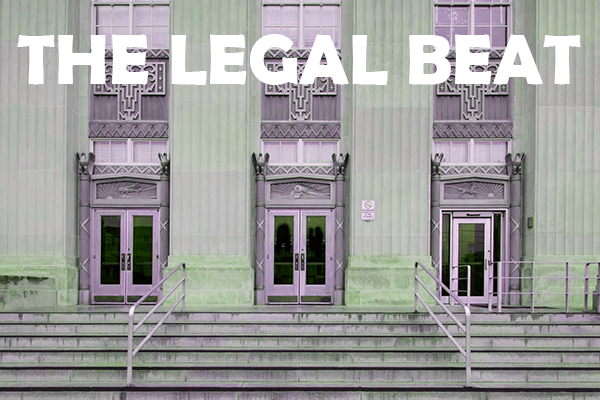|
RCBJ-Audible (Listen For Free)
|
The Legal Beat
Judge Marx Puts A Lid On Legal Fight Among Former Pearl River Chamber Members
Judge Paul Marx of Rockland County Supreme Court has put an end to the litigation surrounding former members of the Pearl River Chamber of Commerce.
Marx dismissed the “malicious prosecution” lawsuit filed by Lisa Williams, also known as Lisa Leote, against former treasurer Michelle Worob and her lawyer Brian Condon and his firm Condon Paxos of Nanuet.
Leote’s lawsuit charged that Worob and her counsel filed a frivolous defamation action against her in bad faith for the purpose of harming and annoying her, and that Worob didn’t have a “reasonable belief” in the validity of her suit against Leote.
Leote also alleged that Worob’s motives were designed to make Leote “financially bleed“ and that her intent was to “destroy” Leote.
Leote also said Worob never made a specific allegation against Leote in her defamation suit and that she never should have been sued.
Worob’s suit against Leote was dismissed last year after Marx found Worob to be a public figure for purposes of defamation, requiring Worob to prove actual malice by the former directors – a standard the court said Worob did not properly plead.
In dismissing Leote’s suit, Marx found Leote could not prevail. He found Worob had a reasonable belief Leote was among the slate of former directors whose statements were reported Feb. 9, 2021 in an article in the Rockland County Business Journal titled ‘Pearl River Chamber Hires Forensic Accountant To Investigate Financial Practices,’ even though no individual director was named.
Worob’s reasonable belief that Leote was among the slate of former directors justified including Leote in the suit, according to Marx.
But Marx also held that Leote failed to allege “special damages,” which are required in a malicious prosecution lawsuit. The list of itemized damages provided by Leote in her complaint did not meet the specificity requirement the law required. Marx denied Leote the opportunity to amend her complaint to plead her damages more specifically.
Meanwhile, Worob has appealed the dismissal of her defamation suit against the former directors. That appeal is pending.
United Hospice Cleared On Discrimination Charges; Judge Says Four Defendants Lacked Evidence To Support Claims
Despite a bevy of allegations of mistreatment at the hands of management at United Hospice, an employment discrimination suit brought by current and former employees has been thrown out by a federal district court, saying the behavior did not give rise to adverse employment actions and that plaintiffs could not establish that the actions taken were actually based on race or ethnicity.
The lawsuit was filed in federal court in White Plains in December of 2020.
Four current and former employees of United Hospice sued the hospice and two managers for employment discrimination. United Hospice, located in New City, offers end-of-life care, including health care, residential care, bereavement services and education for patients and families. The non-profit also runs the Joe Raso Hospice Residence.
The four plaintiffs, three of whom are Hispanic, and one who is Black, described a pattern of discrimination that put the health and safety of minority employees at risk during the COVID-19 pandemic. The suit says that “while many white employees have been allowed to work remotely during the pandemic, Hispanic and Black employees have been required to engage face-to-face with patients and their families – including those who are infected or exhibiting symptoms of COVID-19 infections – even when services could be provided remotely.”
Plaintiffs Elizabeth Alvarado, Ericka Aguilar, Wanda Azu Nieves and Marie Wood Smith allege United Hospice’s work force is starkly segregated with all-white upper management, spiritual advisors and nurses. They complained of abusive and discriminatory treatment at the hands of management.
Allegations included “micromanagement and being written up for matters that comparable white supervisors were not reprimanded for,” “being left out of important supervisory matters and denied sufficient staff support,” “being undermined in daily responsibilities,” and “being denied additional compensation for increased workloads,” but the Court found that these and other allegations did not rise to the level of an “adverse employment action” to sustain a discrimination claim.
The Court also found that there was no “materially adverse change” in the terms of their employment, such as a demotion, a decrease in pay, or termination.
“These claims didn’t have merit,” said Attorney Greg Reilly, who represented United Hospice. “It seemed like a big, sexy complaint initially, but the evidence showed that there was no discrimination. That’s why the claims have been dismissed.”
United Hospice and defendants Judy Peacock, who has since retired and Kara Pace, the CEO, convinced the court that the claims, even if true, could not support an employment discrimination suit. Defendants also persuaded the court that the work environment at United Hospice was not created or based on plaintiffs’ race or ethnicity.
The court also found that the individual directors named in the suit could not be found liable because the organization had not committed the offenses charged.
The court granted summary judgment for United Hospice and closed the case.
Federal Lawsuit Over 2,600 Home Development Project In Sullivan County Town Accuses Officials of Anti-Hasidic Bias
An impasse over permitting to initiate a large housing development in the Catskills has led to a federal discrimination case, with the developer accusing town officials of conspiring to stop an influx of Hasidic families.
The lawsuit was filed by a group that spent $9.5 million in 2020 to buy the land and fully approved plans for Lost Lake Resort, a 2,627-home community. The development site encompasses 3.3 square miles in Forestburgh, a rural Sullivan County town with only about 800 residents.
The suit follows Forestburgh’s denial of several building permits for initial homes and a 10-month review of that decision by the town’s Zoning Board of Appeals, which ultimately upheld the denial with a 35-page ruling in November.
Property owners Lost Lake Holdings LLC and Michconos Mazah LLC sued Forestburgh officials in U.S. District Court in White Plains last month.
In their 90-page filing, attorneys allege the town is trying to thwart a once-welcomed project out of hostility to the Hasidic Jews likely to buy homes there. They denounced the zoning board review as a “sham”, citing the fact that lawyers from the same firm represented both the town officials and the board that was weighing their permit denial.
The case demands the town fairly review the permit applications and seeks an unspecified amount in damages. It alleges violations of the federal Fair Housing Act, the U.S. and New York constitutions and other state laws.
Town officials say they denied permits because the new owners changed the nature of the project, which was originally designed to be an upscale resort community.
The project was granted a zoning change in 2011 and consisted of 2,557 single-family houses, 30 cottages and 40 condominiums, along with an 18-hole golf course and other amenities. The community was to be built in seven phases with 400 homes and the first nine holes of the golf course in the first phase, approved in 2014.
The Dallas-based developer, Double Diamond Companies, spent millions building roads and installing miles of water and sewer pipes and drainage systems, according to the lawsuit. But after selling only about 150 housing lots, Double Diamond abandoned the project and put the property up for sale.
Mordechai Halberstam, a Rockland County builder, told the Times Herald-Record in 2020 he and his family had bought the Lost Lake property and planned to carry out the approved plans. He said they spent $13.3 million for the land and related assets, including mortgages Double Diamond held on 60 undeveloped housing lots that it had sold.
One of the attorneys in the lawsuit said in a statement that the developer had bought the project because all approvals were in place and building permits for the first phase could be issued at any time.














